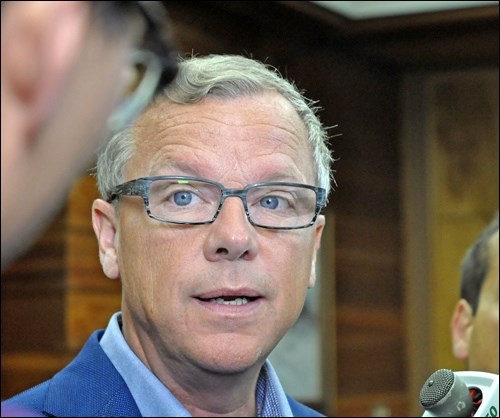On the morning of Thursday, Aug. 10, Brad Wall announced in a YouTube video that he’d retire from politics when the Saskatchewan Party elects a new leader.
“I always thought that the ten year mark, should I be so fortunate to serve that long, might be the right time to re-evaluate,” Wall said.
Saskatchewan Party members, each with one vote, will choose a new leader. Timelines and locations have yet to be announced.
Wall’s announcement included details such as the province’s population increasing by 160,000 people during the last decade, an increase of over 67,000 jobs, and lower income, business and education property tax.
Wall also mentioned more repaired highway kilometres, income assistance, and public works professionals, new schools, and higher provincial credit ratings than when the Saskatchewan Party came to power in 2007.
A press conference followed the announcement’s release. Wall said what he’ll do after politics is yet to be determined, and the role of premier was “the honour” of his working life. He said he had been thinking about retiring from politics since around the end of June this year.
Questions from reporters involved timing, and Wall said retiring in the near future would allow enough time for a new leader to connect to Saskatchewan voters. Another question drew a parallel to Grant Devine’s situation, in which a public perception of the former premier was that Devine resigned as Progressive Conservative leader amid “a financial mess.” Wall disagreed with the characterization and pointed to Saskatchewan achieving the second lowest debt-to-GDP ratio in Canada, a high credit rating, and other financial policies under the Sask. Party government.
Wall said Saskatchewan would benefit from a different leadership style and voice, although he said by style, he didn’t mean political affiliation such as “moving to the right,” but rather a different perspective while the fundamentals of the Sask. Party, such as commitment to economic growth, would stay the same.
Wall said the point of economic growth “is not for the sake of GDP stats and pie charts, it’s so that we can have a quality of life in the province so the government has a broader tax base [to] reinvest in people.”
He said an example of reinvestment was more group home spaces for 440 individuals with intellectual disabilities.
Regarding Aboriginal matters, Wall said there have been improvements, such as in graduation rates of Aboriginal students and “some modest improvement in the gap of Aboriginal unemployment versus general unemployment,” but said “there hasn’t been enough progress that I would point to with satisfaction.”
Wall became leader of the Saskatchewan Party in 2004, and he was elected premier in November 2007. The Sask. Party won elections in 2011 and 2016, and polls have shown Wall’s popularity as premier.
Wall attracted media attention by publicly disagreeing with some of the federal government’s decisions, include the carbon tax, the way in which Syrian refugees would immigrate, and the $10.5 million payment to Omar Khadr.
Politicians responded to Wall’s announcement in press releases. Regina-Qu’Appelle MP and Conservative Party leader Andrew Scheer said in a statement “[Wall’s] record speaks for itself.”
“Under Premier Wall’s leadership, Saskatchewan grew and expanded as never before. Reversing a decades-old trend, Saskatchewan now attracts people from all over Canada and the world, offering jobs, opportunity and growing communities to people from all walks of life.”
Saskatchewan Liberal leader Darrin Lamoureux said the party “wishes to extend our thanks to Premier Wall for his personal commitment and public service to our province,” while denouncing some of the Sask. Party’s decisions.
“After squandering every last dollar of resource revenues during the boom, building costly mega-projects, and being responsible for scandals such as the GTH, we are now faced with the consequences of that government mismanagement, including rising taxes and cuts to critical government services affecting the most vulnerable citizens. Worst, nothing has been left for our province to save for future generations or to begin the transition towards a more diverse, competitive and environmentally sustainable economy.”
Closer to home, the provincial budget in March affected municipalities and school divisions.
Battleford’s Mayor Ames Leslie said he was “shocked, but not surprised” at Wall’s announcement, as he said the last provincial election felt like Wall’s “last shot.”
Mayor Ryan Bater of North Battleford said he wasn’t “overly surprised” at Wall’s announcement, as he said 10 years as premier is generally a “benchmark” in which premiers reconsider their futures.
Regarding the recent provincial budget, Bater said “it wasn’t good for our city.” Because of provincial budgetary decreases, North Battleford “saw the loss of our payments in lieu that were part of our contracts with SaskEnergy,” among other cuts.
Bater said a new leader won’t affect how city council governs due to council’s commitment to political nonpartisanship, but added that a new premier will have “dramatic impact on the province” because of voters’ tendency to consider party leaders when voting.
When hearing announcements regarding politicians’ personal decisions, Bater said he tends “to think about the person making the decision. I think the public doesn’t fully understand the commitment that a person in that role has to make.”
Having worked with cabinet ministers, Bater said “I know [the premier’s] responsibilities and they’re massive. They would take a great toll not just on him, but on his family as well.”

.png;w=120;h=80;mode=crop)


